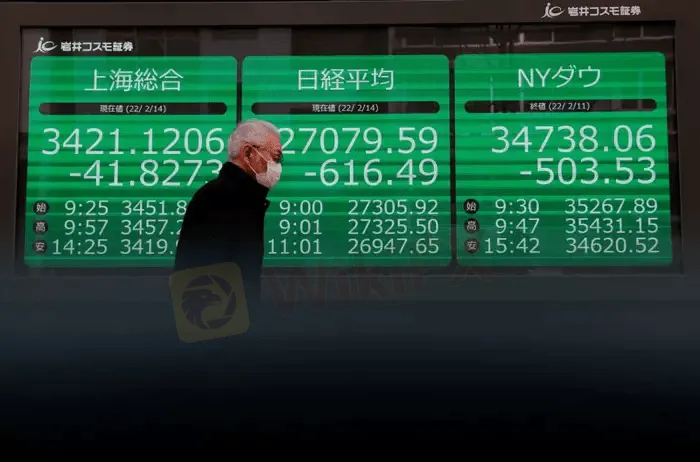简体中文
繁體中文
English
Pусский
日本語
ภาษาไทย
Tiếng Việt
Bahasa Indonesia
Español
हिन्दी
Filippiiniläinen
Français
Deutsch
Português
Türkçe
한국어
العربية
Asian stocks slide with oil on recession jitters; dollar drops
Abstract:Asia stocks continued a decline from Wall Street on Tuesday, and U.S. long-term Treasury yields sank to a four-month low, pulling the U.S. dollar down against the yen and other currencies as investors worried about the risk of global recession.

There were also jitters about an escalation in Sino-U.S. tension with U.S. House of Representatives Speaker Nancy Pelosi set to begin a visit to Taiwan against the objections of China, which regards the self-governed island as a breakaway province.
Australian equities declined amid an uncertain outlook for commodity demand – which also weighed on crude oil prices – while the local dollar hovered near its highest versus its U.S. counterpart since mid-June with the central bank widely expected to deliver a third consecutive half-point interest rate hike later in the day.
The Australian and South Korean equity benchmarks suffered losses of about 0.3% each, while Japans Nikkei tumbled 1.17%.
Chinese blue chips dropped 1.06% and Hong Kongs Hang Seng lost 1.1%.
Taiwans stock index slid 1.68%.
MSCIs broadest index of Asia-Pacific shares retreated 0.8%.
U.S. e-mini stock futures pointed to a 0.31% lower restart for the S&P 500, which stumbled 0.28% overnight.
The week began with China, Europe and the United States reporting weakening factory activity, with that in the U.S. decelerating to its lowest level since August 2020.
That sank crude, with Brent futures edging down to $99.74 on Tuesday after losing almost $4 overnight. U.S. West Texas Intermediate futures also eased to $93.67, extending Mondays almost $5 slide.
“Data releases over the past 24 hours have provided further evidence the global economy is slowing,” National Australia Bank strategist Rodrigo Catril wrote in a note to clients.
“Signs of a slowdown are building” in the United States, while “Chinas reopening activity burst is over,” he said.
The benchmark 10-year U.S. Treasury yield fell as low as 2.53% in Tokyo trade, the lowest since April 5, amid wagers the slowdown could spur the U.S. Federal Reserve to ease its foot off the policy-tightening pedal. The bonds also benefited from safety-seeking demand before Pelosis Taiwan visit, analysts said.
That helped the U.S. dollar slide as low as 130.595 yen for the first time since June 6. The euro jumped as high as $1.0294, a level not seen since July 5.
The Taiwan dollar slipped to its lowest level in more than two years on the weaker side of 30 per U.S. dollar.
Meanwhile, the Aussie was more subdued, retreating 0.26% to $0.7009, but after hitting the highest since June 17 at $0.7048 in the previous session.
Analysts polled by Reuters expect the Reserve Bank of Australia to hike by 50 basis points both on Tuesday and again at its next meeting in September as it races to rein in inflation.
Market participants also see a half-point bump later as a certainty, and have priced an additional 37 basis points of tightening for the September decision.

Disclaimer:
The views in this article only represent the author's personal views, and do not constitute investment advice on this platform. This platform does not guarantee the accuracy, completeness and timeliness of the information in the article, and will not be liable for any loss caused by the use of or reliance on the information in the article.
Read more

Never Heard of Dynasty Trade? Here's Why You Should Be Worried
Have you heard this name before? No , it’s time you do because staying unaware could cost you. This platform is currently active in the forex trading and has been linked to several suspicious activities. Even if you’ve never dealt with it directly, there’s a chance it could reach out to you through ads, calls, messages, or social media. That’s why it’s important to know the red flags in advance.

Want to Deposit in the EVM Prime Platform? Stop Before You Lose It ALL
Contemplating forex investments in the EVM Prime platform? Think again! We empathize with those who have been bearing losses after losses with EVM Prime. We don't want you to be its next victim. Read this story that has investor complaints about EVM Prime.

WEEKLY SCAM BROKERS LIST IS OUT! Check it now
If you missed this week's fraud brokers list and are finding it difficult to track them one by one — don’t worry! We’ve brought together all the scam brokers you need to avoid, all in one place. Check this list now to stay alert and protect yourself from fraudulent brokers.

Catch the Latest Update on BotBro & Lavish Chaudhary
BotBro, an AI-based trading platform, became popular in India in 2024—but for negative reasons. Its founder, Lavish Chaudhary, who gained a huge following by promoting it heavily on social media. Since then, he has become well-known, but for many controversies. Let’s know the latest update about Botbro & Lavish Chaudhary.
WikiFX Broker
Latest News
RM750 Million Lost to Investment Scams in Just Six Months
5 things to know before the Thursday open: Meme stock revival, Trump's Fed visit, Uber's gender feature
Why Octa Is the Ideal Broker for MetaTrader 4 & 5 Users
CNBC's Inside India newsletter: Leaving, but not letting go — India's wealthy move abroad, but stay invested
Moncler raises prices on tariffs, may postpone store openings if downturn worsens
Titan FX Adds WhatsApp and Telegram for Enhanced Support
Nestle flags further potential price hikes as tariffs, commodities weigh on margins
Stop Level Forex: How Does it Help Traders Prevail When Losses Mount?
eToro Launches Spot-Quoted Futures Trading in Spain
Titan FX Introduces Redesigned Client Cabinet for Enhanced Usability
Currency Calculator


